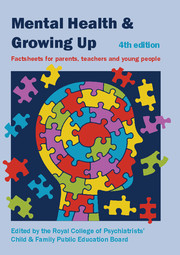Book contents
- Frontmatter
- Contents
- Contributors
- Factsheets for young people
- Factsheets for parents, carers and anyone who works with young people
- 1 Good parenting
- 2 The restless and excitable child
- 3 Dealing with tantrums
- 4 Children who soil or wet themselves
- 5 Sleep problems in childhood and adolescence
- 6 Behavioural problems and conduct disorder
- 7 Attention-deficit hyperactivity disorder (ADHD)
- 8 The child with general learning disability
- 9 Specific learning difficulties
- 10 Autism and Asperger syndrome
- 11 Depression in children
- 12 Worries and anxieties: helping children to cope
- 13 Divorce or separation of parents: the impact on children and adolescents
- 14 Death in the family: helping children to cope
- 15 The emotional cost of bullying
- 16 Traumatic stress in children
- 17 Domestic violence: its effects on children
- 18 Child abuse and neglect: the emotional effect
- 19 Drugs and alcohol: what parents need to know
- 20 Self-harm in young people
- 21 Psychosis
- 22 Schizophrenia
- 23 Bipolar disorder in children and adolescents
- 24 Obsessive–compulsive disorder in children and young people
- 25 Eating disorders in young people
- 26 Chronic physical illness: the effects on mental health
- 27 Medically unexplained physical symptoms
- 28 Chronic fatigue syndrome: helping your child get better
- 29 Parental mental illness: the problems for children
- 30 Who's who in CAMHS
13 - Divorce or separation of parents: the impact on children and adolescents
from Factsheets for parents, carers and anyone who works with young people
Published online by Cambridge University Press: 02 January 2018
- Frontmatter
- Contents
- Contributors
- Factsheets for young people
- Factsheets for parents, carers and anyone who works with young people
- 1 Good parenting
- 2 The restless and excitable child
- 3 Dealing with tantrums
- 4 Children who soil or wet themselves
- 5 Sleep problems in childhood and adolescence
- 6 Behavioural problems and conduct disorder
- 7 Attention-deficit hyperactivity disorder (ADHD)
- 8 The child with general learning disability
- 9 Specific learning difficulties
- 10 Autism and Asperger syndrome
- 11 Depression in children
- 12 Worries and anxieties: helping children to cope
- 13 Divorce or separation of parents: the impact on children and adolescents
- 14 Death in the family: helping children to cope
- 15 The emotional cost of bullying
- 16 Traumatic stress in children
- 17 Domestic violence: its effects on children
- 18 Child abuse and neglect: the emotional effect
- 19 Drugs and alcohol: what parents need to know
- 20 Self-harm in young people
- 21 Psychosis
- 22 Schizophrenia
- 23 Bipolar disorder in children and adolescents
- 24 Obsessive–compulsive disorder in children and young people
- 25 Eating disorders in young people
- 26 Chronic physical illness: the effects on mental health
- 27 Medically unexplained physical symptoms
- 28 Chronic fatigue syndrome: helping your child get better
- 29 Parental mental illness: the problems for children
- 30 Who's who in CAMHS
Summary
How are children affected?
A child may feel:
• a sense of loss – separation from a parent can mean you lose not only your home, but your whole way of life
• different, with an unfamiliar family
• fearful about being left alone – if one parent can go, perhaps the other will do the same
• angry at one or both parents for the relationship breakdown
• worried about having caused the parental separation, guilty
• rejected and insecure
• torn between both parents.
These feelings are often made worse by the fact that many children have to move home and sometimes school when parents separate. Most families in this situation come under some financial strain, even if they did not have money worries before.
Even if the parental relationship had been very tense or violent, children may still have mixed feelings about the separation. Many children hold on to a wish that their parents may get back together.
Whatever has gone wrong in the relationship, both parents still have a very important part to play in their child's life.
What type of difficulties can children present with?
Emotional and behavioural problems in children are more common when their parents are fighting or separating. Children can become very insecure. Insecurity can cause them to behave like they are much younger: bed-wetting, being clingy, nightmares, worries or disobedience can all occur. This behaviour often happens before or after visits to the parent who is living apart from the family. Teenagers may show their distress by misbehaving or withdrawing into themselves. They may find it difficult to concentrate at school.
What can I do to help?
Parents who are separating can help their children. They should protect them from adult worries and responsibilities, and make it clear that the responsibility for what is happening is the parents’ and not the child's.
Things that can help your child
• Be open and talk. Your child not only needs to know what is going on, but needs to feel that it's OK to ask questions.
• Reassure them that they will still have two parents who love them, and will continue to care for them.
• Make time to spend with your child.
• Be reliable about arrangements to see your child.
- Type
- Chapter
- Information
- Mental Health and Growing UpFactsheets for Parents, Teachers and Young People, pp. 84 - 86Publisher: Royal College of PsychiatristsPrint publication year: 2013



